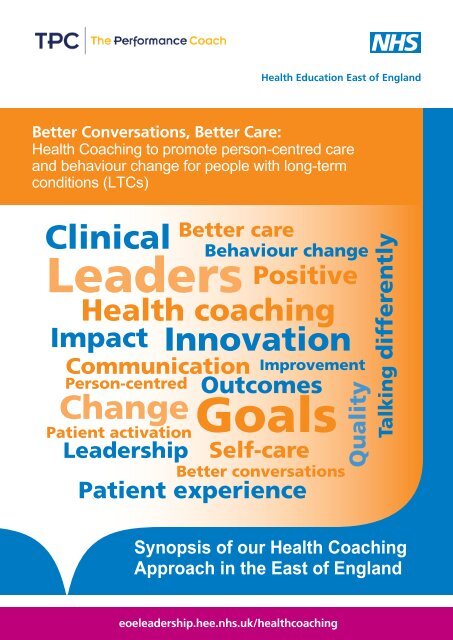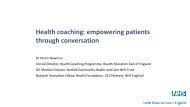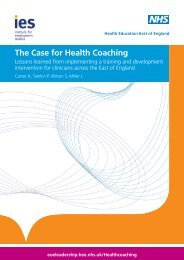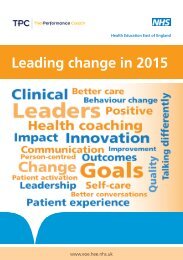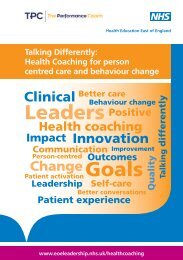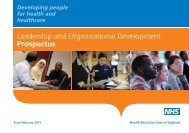Better Conversations, Better Care
Create successful ePaper yourself
Turn your PDF publications into a flip-book with our unique Google optimized e-Paper software.
<strong>Better</strong> <strong>Conversations</strong>, <strong>Better</strong> <strong>Care</strong>:<br />
Health Coaching to promote person-centred care<br />
and behaviour change for people with long-term<br />
conditions (LTCs)<br />
Clinical<br />
Leaders<br />
Health coaching<br />
Impact<br />
Communication<br />
Person-centred Outcomes<br />
Change<br />
Patient activation<br />
Leadership<br />
<strong>Better</strong> care<br />
Behaviour change<br />
Positive<br />
Innovation<br />
Goals<br />
Self-care<br />
Patient experience<br />
Improvement<br />
<strong>Better</strong> conversations<br />
Quality<br />
Talking differently<br />
Synopsis of our Health Coaching<br />
Approach in the East of England<br />
eoeleadership.hee.nhs.uk/healthcoaching
What is health coaching?<br />
Health coaching enables people to gain the<br />
knowledge, skills, tools and confidence to<br />
become active participants in their care so<br />
that they can reach their self-identified goals.<br />
By raising awareness and responsibility in<br />
people with long term conditions (LTCs) to selfmanage,<br />
and putting them at the centre of their<br />
care, health coaching training for clinicians can<br />
improve patient outcomes and experience,<br />
reduce costs, address inequalities and enable<br />
behaviour change.<br />
The need to “activate” clinicians<br />
The impact of LTCs on patients’ quality of life<br />
and NHS costs (around 70%) is escalating.<br />
Detrimental health behaviours cause 60% of<br />
deaths.<br />
Informed, empowered patients have the<br />
knowledge, skills and confidence to manage<br />
their own health and they make healthier<br />
lifestyle choices, personally relevant decisions,<br />
adhere to treatment regimes, and experience<br />
fewer adverse events. Activated patients save<br />
between 8% and 21% of costs. However,<br />
although there are many initiatives to empower<br />
patients to self-care directly, and public health<br />
programmes at a population level, there is a gap<br />
in clinician education and hence their approach<br />
to self-care support with individual patients.<br />
Implementation of health<br />
coaching training across<br />
the east of England<br />
Health coaching is used throughout the USA and<br />
has now been rolled out extensively across the<br />
east of England, where it is integrated into<br />
patient’s usual care rather than as a referral<br />
service. Health Education East of England<br />
(HEEoE) commissioned roll out after initial<br />
piloting in 2010 by Drs McDowell and Newman<br />
with practice nurses in Suffolk, which<br />
demonstrated improvements in self-efficacy and<br />
patient satisfaction.<br />
Since 2013 nearly 800 clinicians have attended a<br />
2 day training programme in a health coaching<br />
approach including nurses, doctors and allied<br />
health professionals from 45 organisations across<br />
community, primary care, mental health and acute<br />
settings. Twenty NHS trainers have been trained<br />
through a 10 day training programme (including<br />
co-delivery). A series of workshops and<br />
conferences including national leaders in person<br />
centred care, helped raise awareness and ensure<br />
organisational embedding, including liaising with<br />
individual organisational coordinators.<br />
Now many organisations across the east of<br />
England are exploring further roll out using NHS<br />
trainers and other funding sources e.g. through<br />
CPD, some incentivised by their commissioners<br />
e.g. through a CQUIN. Initial plans are for 800<br />
more clinicians to be trained and organisations<br />
such as Cambridgeshire Community Services<br />
NHS Trust and West Suffolk NHS Foundation<br />
Trust will have trained hundreds of clinicians as<br />
part of their strategies for integrated and person<br />
centred care.<br />
Uptake of Health Coaching in the East of<br />
England 2013-2015<br />
Health coaching training includes behaviour<br />
change theory, motivational strategies and<br />
communication techniques which develop<br />
patients’ intrinsic motivation for change<br />
addressing this gap. It enables a tailored<br />
consultation style that draws on patient’s own<br />
resources, is based on behaviour change<br />
science and augments other approaches to<br />
empowerment e.g. care planning.<br />
2
Outcomes and Evaluation<br />
Health coaching training acts in four ways:<br />
• Reducing mortality, poor quality of life, high<br />
health care utilisation (and cost) for people<br />
with LTCs through improving selfmanagement<br />
and health seeking behaviour.<br />
• Reducing the prevalence of LTCs through<br />
coaching for activation, healthy behaviours<br />
and better lifestyle choices.<br />
• Improving decision making where<br />
different treatment options are available.<br />
• Providing training in patient centred care<br />
and improving clinician communication, a<br />
major source of patient dissatisfaction.<br />
The following evaluation reports, commissioned<br />
by Health Education East of England, are<br />
available at eoeleadership.hee.nhs.uk:<br />
1. Interim Progress<br />
Report including<br />
participant feedback<br />
Over 96% of clinicians rated<br />
content, delivery, learning<br />
opportunities and application<br />
to their work as good/very<br />
good. Post training feedback<br />
was of a change in mind set<br />
and belief, move from “fixer”<br />
to enabler, more listening,<br />
and much-enhanced skills in<br />
identifying patient goals and<br />
behaviour change.<br />
2. Institute of Employment Studies (IES)<br />
qualitative evaluation assessed local evidence<br />
of impact and involved focus groups, interviews<br />
and five organisational case studies included a<br />
CCG, a partnership trust, an accute hospital, a<br />
GP surgery, and a community provider.<br />
Overall clinicians perceived the 2-day training<br />
intervention as effective with high levels of<br />
usage with patients of the coaching skills<br />
acquired through training. Organisational culture<br />
and work context were key success factors with<br />
greater local support ensuring transfer of<br />
learning to daily roles.<br />
More specifically the evaluation found:<br />
• Two-thirds of clinicians were using a health<br />
coaching approach with positive outcomes. It<br />
had a wide application in the management of<br />
depression, obesity, foot ulcers, pain, anxiety,<br />
COPD, coronary heart disease, poor renal<br />
function, hypertension, in smoking cessation<br />
and lifestyle.<br />
• Reported benefits in NHS efficiency and<br />
effectiveness included higher patient<br />
compliance; reduction in episodes of care;<br />
reduction in appointments per patient;<br />
improved quality and consistency; quicker<br />
discharge off caseload; potential to cut<br />
waiting list times and for less acute<br />
admissions; less waste from unnecessary<br />
tests and medication.<br />
• Benefits to patients reported by clinicians<br />
included increased confidence; increased<br />
patient empowerment; more personalised<br />
advice/care; reduced dependency; increased<br />
satisfaction and less medication.<br />
• A case study indicated a 63% indicative cost<br />
saving from reduced clinical time post<br />
compared to pre-training, giving a potential<br />
annual saving of £12,438 per FTE if reduced<br />
clinical time was widely replicable and<br />
sustainable over time compared to £400<br />
investment in training per participant.<br />
3. Does Health Coaching<br />
work? - a rapid review by<br />
The Evidence Centre<br />
The review of evidence<br />
included 275 studies of<br />
health coaching principally<br />
as a referral service in the<br />
USA, a standalone<br />
intervention or part of a<br />
system of care, and carried<br />
out by telephone, online or<br />
face-to-face. Methodological difficulties<br />
make comparison of results to the NHS<br />
difficult.<br />
Importantly, the literature indicates that<br />
health coaching works best for people<br />
most in need. Health coaching can support<br />
patients’ motivation to self-manage and<br />
adopt healthy behaviours;<br />
is widely applicable; and can be adopted<br />
by all professionals and peer coaches.<br />
Implementation should be accompanied by<br />
further evaluating the most cost-effective<br />
methods of training clinicians, and patient<br />
outcomes. Health coaching works best<br />
aligned to other management strategies<br />
for people with LTCs.<br />
3
Cost effectiveness<br />
Feedback from clinicians<br />
The cost of each programme delivered by<br />
training providers was £7,100 for up to 18<br />
participants or £400 per participant. Costs are<br />
halved when local trainers co-deliver as part of<br />
their training and are reduced to costs of<br />
training materials when delivered by local<br />
trainers. Although the international literature<br />
reviewed found mixed evidence on costeffectiveness,<br />
with some studies indicating no<br />
financial savings, other studies do show<br />
significantly reduced costs through fewer<br />
consultations, tests, medication and other care<br />
costs, due to improved self-management by<br />
patients. Health coaching is one of a few<br />
interventions that can increase patient<br />
activation which has achieved savings of<br />
between 4% and 21% of costs.<br />
"I feel that health coaching provides a<br />
more inclusive conversation allowing<br />
discussions to be collaborative and<br />
empathetic rather than prescriptive."<br />
"Using a ‘coaching’ as opposed to a<br />
‘telling’ approach increases self-esteem<br />
and ability to work independently in team<br />
members and helps them to feel more<br />
listened to and supported."<br />
Strategic fit<br />
Health coaching:<br />
• Meets the desire of many people with LTCs<br />
to be more involved in their own health and<br />
care.<br />
• Can help manage demand while<br />
simultaneously delivering an improved patient<br />
experience.<br />
• Delivers on the Five Year Forward View<br />
and addresses national priorities including<br />
prevention and management of long term<br />
conditions (e.g. diabetes), transition from<br />
hospital, mental health, medication<br />
adherence and frail elderly.<br />
• Supports creation of a modern workforce<br />
through re-energising clinicians and<br />
providing them with transferable coaching<br />
skills for leadership.<br />
• Creates a social movement through<br />
developing clinician advocates for patientcentred<br />
care.<br />
• Contributes to delivery of the Public Health<br />
Outcomes Framework and NICE Guidance<br />
and the need to educate and train<br />
practitioners on evidence-based techniques.<br />
• Alongside executive coaching training,<br />
contributes to an emergent coaching<br />
culture in the NHS and new leadership<br />
styles amongst managers and clinicians.<br />
"I think through modelling a coaching<br />
conversation others have had the<br />
confidence to roll this out too. Being on the<br />
receiving end of coaching enables you to<br />
see the enormous potential of it and what<br />
a positive, liberating, powerful process it<br />
is."<br />
Next steps<br />
Health Education East of England is now<br />
working with the Coalition for Collaborative <strong>Care</strong><br />
and others to enable health coaching techniques<br />
to be built into mainstream practice to support<br />
people with LTCs and behaviour change. In<br />
addition, we are seeking to undertake further<br />
research on cost effectiveness and outcomes as<br />
health coaching is a new innovation in the UK.<br />
Providing information and OD consultancy<br />
support for organisations in east of England on<br />
implementing health coaching, visit:<br />
eoeleadership.hee.nhs.uk/healthcoaching for<br />
more information and resources or contact<br />
Leanne Dellar on leanne.dellar@nhs.net<br />
4
Contacts<br />
HEEoE Project team<br />
Health Coaching Delivery<br />
Dr Penny Newman<br />
Associate and Clinical Lead<br />
penny.newman1@nhs.net<br />
Dr Andrew McDowell<br />
Lead Trainer, Director,<br />
The Performance Coach<br />
andrew@theperformancecoach.com<br />
Karen Bloomfield<br />
Leadership and Organisational<br />
Development Manager<br />
kbloomfield@nhs.net<br />
Ali Demery<br />
Senior Project Manager<br />
The Performance Coach<br />
ali@theperformancecoach.com<br />
Leanne Dellar<br />
Project Support<br />
leanne.dellar@nhs.net<br />
Evaluation<br />
Dr Alison Carter<br />
Lead Researcher and<br />
Principal Associate Fellow,<br />
Institute for Employment Studies<br />
alisoncarterdba@aol.com<br />
Professor Debra de Silva<br />
Head of Evaluation<br />
The Evidence Centre<br />
debra@evidencecentre.com<br />
Success<br />
Potential<br />
Belief<br />
Motivating<br />
Powerful<br />
Inspirational<br />
Resources Refreshing<br />
Collaborative<br />
Energy<br />
Positive<br />
Dedicated<br />
Patient experience<br />
Needed<br />
Transformational<br />
Life-changing<br />
Enthusiasm<br />
Passion<br />
Will<br />
Change<br />
Empowerment<br />
Future<br />
5
Clinicians are now thinking differently about how they talk with patients<br />
using a Health Coaching approach.<br />
"I find myself seeing more potential and possibilities,<br />
which energises my practice and makes me re-evaluate<br />
my approach as a clinician. This has been reinforced<br />
by the incredible results."<br />
"By allowing patients to think about their<br />
problems and not telling them what I think they<br />
ought to do but letting them make their own<br />
decisions"<br />
"Giving the patients the space to create their<br />
own options and ideas of how they will manage<br />
their relationship with their long term condition.<br />
Spend more time exploring their reality."<br />
eoeleadership.hee.nhs.uk/healthcoaching


